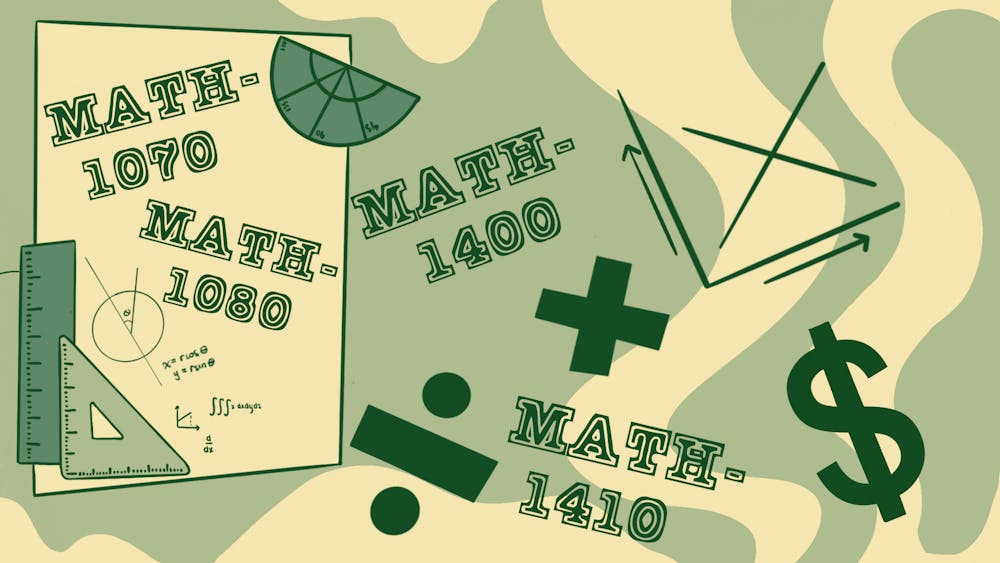Economics majors at Penn are no longer required to take MATH 1400: "Calculus I" and MATH 1410: "Calculus II" after the creation of two new math courses.
In an attempt to adapt Penn’s math curriculum to students of all disciplines, the Department of Mathematics created two new courses tailored to students of the social sciences, specifically the economics major. The new courses — MATH 1070: "Mathematics of Change, Part I" and MATH 1080: "Mathematics of Change, Part II" — can now be taken to fulfill the mathematics requirement of the economics major.
Prior to the fall 2022 semester, students who were required to take the introductory and multivariate calculus sequence — such as economics majors — had to take both MATH 1400 and MATH 1410. While the economics major still accepts MATH 1400 and MATH 1410, Department of Economics Undergraduate Chair Francis Diebold said that MATH 1070 and MATH 1080 are now the preferred calculus sequence.
These courses, often considered some of the least popular courses at the University, have received pushback for their teaching practices, including the flipped classroom format and weekly quizzes. MATH 1400 and MATH 1410, which were recently adapted to an engineering-focused curriculum, are also heavy on physical science applications.
The new courses, MATH 1070 and the subsequent MATH 1080, are intended to provide a new option for social science students, Diebold said. The courses were created as calculus classes that de-emphasize physical applications of calculus in favor of more theoretical applications, as well as microeconomics and game theory.
The courses use active learning format, which includes "lectures, small group problem solving, and classwide activities and discussion," compared to MATH 1400 and MATH 1410's flipped classroom format.
While the new courses are primarily oriented towards economics majors — the only social science major to require multivariate calculus at Penn — students in other disciplines may take the course. For instance, Wharton students may use MATH 1070 to fulfill their math general education requirement, applying calculus to financial predictions and modeling.
The primary concepts between MATH 1070 and MATH 1400, as well as MATH 1080 and MATH 1410, will remain the same, allowing students to alternate between the two tracks and prepare for further mathematical study. MATH 1070 was taught by Mathematics professor Andrew Cooper last fall and Mathematics professor Henry Towsner is teaching MATH 1080 this spring, according to Penn Course Review.
RELATED:
Penn Dental signs memorandum of understanding with South African and Tanzanian universities
American Bar Association votes to keep standardized testing for law school admissions
Diebold said that topics such as geometric integrals, advanced integration techniques, and vector calculus — which are heavily emphasized in MATH 1400 and MATH 1410 — are often of little to no use to social science students. In the new curriculum, these topics are de-emphasized in favor of more abstract concepts like estimation, growth rates, and optimization, he said.
“[MATH 1070 and MATH 1080 are] immensely important to students because [they are] much more closely tailored to the things that economists and most social scientists need,” Diebold said.
Diebold said that 1070 and 1080 are “self-contained,” meaning students entering the sequence are not assumed to have any previous calculus knowledge. He added that after taking these courses, students will be well-prepared for higher-level math classes, such as MATH 2400, should they choose to advance.
“The reason you have to take multivariable calculus [in economics] is optimization; it’s not emphasized in 1410,” College freshman Jonathan Mosenco, an economics major currently taking MATH 1080, said.
Currently, the new courses are in their pilot year with MATH 1070 being first offered in the fall of 2022, and MATH 1080 being first offered this spring. Penn will officially offer both courses in the fall of 2023, after which it plans to offer both courses each semester. That said, the Math Department expects most people will prefer to enroll in MATH 1070 in the fall and MATH 1080 in the spring, Undergraduate Chair Philip Gressman said.
Students that spoke with The Daily Pennsylvanian said that they were curious to try the new courses as alternatives to the previous calculus sequence and they have had a positive experience so far. College sophomore Silas Ruth, an economics major currently taking MATH 1080, said that the reputation of 1400 and 1410 encouraged him to try the new sequence.
“I had heard pretty negative things about MATH 1410," Ruth said, "so I was interested in trying something new."
Ruth, who previously took MATH 1400, also said that the courses had different structures. Whereas he found that lectures in MATH 1400 were very poorly attended, he said that the group-oriented approach in MATH 1080 encourages participation and attendance.
Mosenco agreed, adding that his class has 30 students, who "sit at smaller tables and get to do the problems together."
Ruth said that lectures in MATH 1400 were not “in sync” with the concepts being taught in the videos, but MATH 1080’s use of a textbook and pre-class exercises reinforces the material taught in lecture.
“If you’re an [economics] major and want to develop a high-level multivariable calculus skillset, I would definitely highly recommend [MATH 1070 and MATH 1080]," Ruth said.









